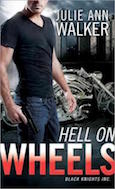These witchy rom-coms are whimsical and hilarious—with just a touch of wickedness.
Witch Please
In Witch Please by Ann Aguirre, Danica Waterhouse knows the rules: Mundanes are off-limits. She interacts with them as needed to keep her electronic repair business running, but they can never know the truth about her power, and they can never be considered romantically. The family curse says falling for a mundane will drain a Waterhouse witch’s magic away. Magic binds Danica to her work, her family, her coven—everything that matters. So when she meets the most incredible man, and feels the most incredible draw to him, she makes an incredible effort to keep her distance . . . and fails. Because Titus Winnaker is amazing: handsome, funny, goofy and smitten with Danica from the start. And he bakes. And he’s a volunteer firefighter. And he’s absolutely forbidden.
Smart, strong, determined and compassionate, Danica knows how to fix everything except her own heart, and her turmoil is palpable on the page. Endearing, clueless Titus is a beautiful cinnamon roll, too sweet for this world. The most magical moments they share don’t involve any witchcraft at all but instead feature two people simply being good to each other, in every imaginable way. Aguirre has concocted an exciting, engaging whirl of a story.
The Ex Hex
Vivienne Jones—spurred on by her broken heart, her loyal, vengeful cousin and way too much vodka—curses her no-good, horrible ex to have bad hair, bad sex and bad luck forever and ever, amen. However, when Rhys Penhallow returns to the small town of Graves Glen, Georgia, nine years later, his hair is still perfect and his sex appeal is still intact. So Vivi concludes, with a little sadness and a little relief, that her momentary whim of a curse didn’t take. But then a series of mishaps proves that bad luck has infected the town, potentially leading to disaster if the situation isn’t solved by Samhain, which is fast approaching.
While The Ex Hex is pure rom-com with its fun tone and witty characters, author Erin Sterling takes things deeper with potent, beautifully portrayed symbolism, especially when it comes to tarot cards and the intriguing, melancholy mystery tangled up with the curse. It’s a romance magically enhanced to be more vivid, more daring and more potentially deadly, and it’s all the more satisfying for it.
★ Payback’s a Witch
In Lana Harper’s Payback’s a Witch, there’s not just one witch scorned. There are three. Emmy Harlow left town as a brokenhearted teen after being used and discarded by Gareth Blackmoore, scion of the richest, most influential family in Thistle Grove. The four witch families that founded the town still run things, but the lion’s share of power and influence goes to whichever family wins the “Gauntlet,” a semicentennial event that the Blackmoores have won pretty much every time. The Thorns and the Avramovs have always lagged behind, and the Harlows have never stood a chance—which is why Emmy got the whole “It’s not you, it’s how utterly insignificant your family is” brush-off from Gareth years ago. But now she’s back, and she learns that Gareth has since toyed with Emmy’s longtime bestie, Linden Thorn, and also with Emmy’s secret high school crush, the stunning, untouchable Talia Avramov. And thus an alliance is formed as the three women come together with the goal of toppling the ascendency of the Blackmoores and putting Gareth firmly in his place.
Harper’s adult debut is gorgeous in every way. It’s hilariously funny, deeply moving, powerfully uplifting and so glue-you-to-the-page engrossing that this reviewer literally did not put it down for the final hundred pages. The love story between Talia and Emmy develops beautifully, but the true romance is with the town and the community. The bonds of both family and friendship shine from start to finish, and Harper balances the different clans and captures how, together, they make Thistle Grove the magical place that it is.







 Black Knights Inc.
Black Knights Inc. Fatal
Fatal The O’Malleys
The O’Malleys Anita Blake, Vampire Hunter
Anita Blake, Vampire Hunter Argeneau
Argeneau Kate Daniels
Kate Daniels Psy-Changeling
Psy-Changeling





 Isabel Cooper
Isabel Cooper Elizabeth Kingston
Elizabeth Kingston Jeannie Lin
Jeannie Lin


 Amanda Quick
Amanda Quick





















